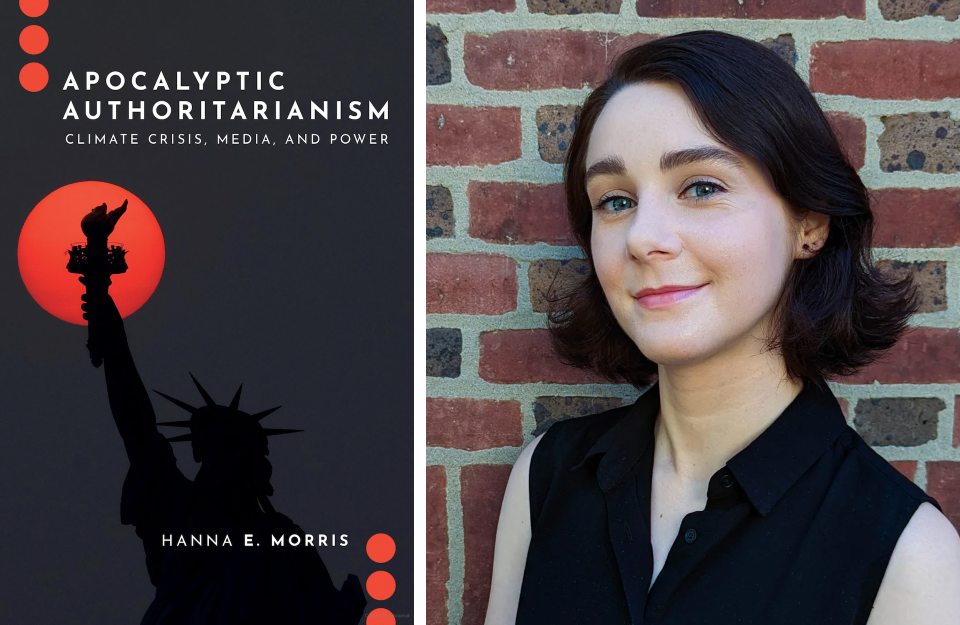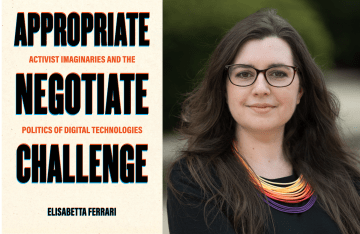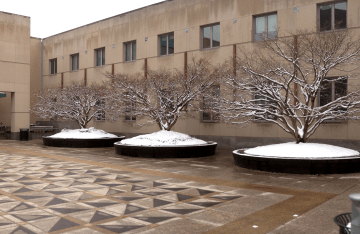Apocalyptic Authoritarianism: Q&A with Hanna Morris (Ph.D. '21)
In her debut book, the University of Toronto assistant professor delves into the intersection between mainstream U.S. climate journalism and politics.

As climate change accelerates, leading to striking and devastating consequences around the world, U.S. media coverage of the crisis has increased. But what’s behind the coverage?
In her new book, Apocalyptic Authoritarianism: Climate Crisis, Media, and Power, Annenberg alum Hanna Morris (Ph.D. '21) analyzes the ways that journalists have framed and communicated the climate crisis since the 2016 election of Donald Trump and its impact on public perceptions of the crisis and political action.
“There were a lot of clear anti-democratic trends emerging at the time of Trump’s first election,” Morris says, “and at the same time, really pronounced visible threats of climate change. These threats were combined and interpreted by journalists as a ‘total crisis.’ What I found was that by framing these threats together as a total crisis, journalists avoided analyzing how we got here to begin with.”
We recently spoke to Morris, assistant professor at the School of the Environment at the University of Toronto, about the book, which is available now from Oxford University Press.
Where does the term "apocalyptic authoritarianism” come from, and how does it relate to your book?
I introduce the term “apocalyptic authoritarianism” in my book to describe a new mode of reactionary politics that emerged out of the tumult of Donald Trump’s first presidential election in 2016. Essentially, apocalyptic authoritarianism describes the reactionary posturing and political alignment of historically privileged figures transcendent of the partisan center and right who are united through a common enemy of the “new” New Left and a shared appeal to apocalyptic visions of “total crisis.”
As I reveal in my book, would-be apocalyptic authoritarians go so far as to fantasize about the apocalyptic death of everyone but themselves because of the opportunity this mass destruction apparently affords them.
My book shows how U.S. climate journalism is bolstering and normalizing these apocalyptic fantasies, instead of reckoning with the roots and ramifications of both climate change and the reactionary politics of today.
Climate journalism often presents potential solutions to climate change. What are some of the popular solutions covered in the magazines, newspapers, and other media you studied?
One of the central predicaments that my book illuminates is how the chaos wrought by Trump’s first and now second presidential terms can be so overwhelming that it often propagates a nostalgic search for the good old days. U.S. journalists have fallen into this trap of looking backwards for so-called “solutions” to both present-day climate and political chaos, and in turn, have romanticized the past instead of fundamentally reckoning with how we got here.
My book shows how this nostalgic longing for an imagined American golden age tends to be most pronounced among traditionally privileged groups, including traditional journalists, and closes off more transformative political visions and proposals for change. This backwards-looking nostalgia poses a real challenge for more transformative climate policies because it casts progressive proposals for change as too extreme, socialist, and thus anti-American.
My book shows how the types of solutions that are centered as the correct responses to climate change are deemed so because they don’t upend the status quo. These solutions, for example, include top-down market mechanisms and planetary-scale technological “fixes” designed by just a few apparently very smart men who I refer to in my book as “visionary sages.”
In the book, you mention that mainstream climate journalism often maligned climate activists. How so, and how does that relate to U.S. politics?
Yes, this is a really important part of my book’s argument. Through this backwards-looking nostalgia for an American golden age, journalists writing for major national news publications repeatedly position the years immediately following World War II as when this golden age occurred. This is notable because this early postwar period is before the Civil Rights Movement and radical pro-democracy politics of the late-1960s and 1970s began. My book shows how mass politics and the pro-democracy movements then and now were – and continue to be – met with intense trepidation by traditional figures of power. These elite anxieties shaped the news media’s reporting on the revolutionary politics of the 1960s and 1970s and again in the 2010s and 2020s.
My book shows how these anxieties have led to fearmongering about a supposedly “uncivil” and “woke” contingent of “militant” and “extremist” leftist radicals and climate justice “warriors” who are reported on as threatening to both national and planetary stability. Concerningly, this fearmongering is precisely where apocalyptic authoritarianism hardens the line between “us” and “them.” There is little room for imagining alternative national identities and alternative futures beyond the one supposedly “right” way as determined by just a few, self-declared visionary sages.
How has your time at Annenberg helped you in your current career?
I started my Ph.D. in 2016 and finished in 2021 – so my time at Annenberg began with an alarming first Trump presidency and ended with a horrific pandemic.
Honestly, the stakes felt high throughout my time as a student. I really wanted to learn how to produce thoughtful and deeply contextualized scholarship that could have real, public impact and not just remain in the realm of abstract theory-building alone. My dissertation and book project are my attempts at doing this. I hope that my book may provide some critical clarity and possible collective avenues forward as we grapple with our troubling present. I do also have to say, Annenberg was absolutely the ideal intellectual home to help me do this work.
The incredible faculty and students at Annenberg constantly inspired me and always kept me on my toes! I’m especially grateful to have had the chance to work with Dr. Barbie Zelizer, who was my dissertation supervisor. Barbie is so brilliant and always pushed me to keep thinking, writing, re-writing, and working to be the best scholar I could possibly be. I’m truly grateful for this.



